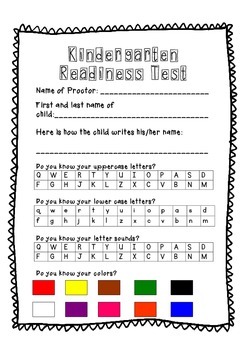

- #SOCIAL QUESTIONS IN KINDERGARTEN SCREENING TEST HOW TO#
- #SOCIAL QUESTIONS IN KINDERGARTEN SCREENING TEST FULL#
- #SOCIAL QUESTIONS IN KINDERGARTEN SCREENING TEST PLUS#
The one that I used most in the school was the Clinical Evaluation of Language Fundamentals-5th Edition (CELF-5) Screening Test. There are a number of good screeners out there.
#SOCIAL QUESTIONS IN KINDERGARTEN SCREENING TEST PLUS#
I’m going to make some recommendations for formal screeners, plus some non-standardized tasks you can do to supplement those. There are a handful of language screeners out there, some that are standardized, and some that aren’t.
#SOCIAL QUESTIONS IN KINDERGARTEN SCREENING TEST FULL#
Those test scores of course play a part in our decision, but we want to use multiple sources of information so we’re getting the full picture, not just a contrived snapshot. This way, we have checks and balances in the system so we aren’t basing our decision on one test score. That means it can involve a number of different tasks and tools that help us come to an educated decision. It’s a process that help us to determine if there are enough red flags to warrant an evaluation. However, we need to shift our focus from thinking of screening as a “test”, or “tool”…because it’s not.Ī screening isn’t a “test”. When we think of a “language screening”, most people think of some kind of test.
#SOCIAL QUESTIONS IN KINDERGARTEN SCREENING TEST HOW TO#
So that that we’ve covered our bases legally, let’s talk about how to actually do that screening. Since state laws may vary, I recommend going ahead and getting consent to cover your bases if you’re going to formally screen, observe, or consult with the teacher for the purposes of determining if an evaluation is needed. IDEA (2004) requires you to get consent for special education evaluations and to provide special education services, so a general rule of thumb is that you’d also want to get consent for a screening to consider a special education evaluation. In this case, the student is getting something above and beyond standard general education protocol. They want you to do a formal language screening. They’ve completed the district-wide screening, and staff have concerns. Now let’s say you have a student who is struggling. Parents will typically be notified of screenings and results, but they do not get special consent because it’s part of the standard general education protocol. In this case, if these procedures are being done with all the kids in that district, grade, or class, we do not need to get consent to stay in compliance with IDEA (2004). Staff also may do grade-level assessments, or even assessments with specific classes.

Information about evaluation and screening procedures as outlined by Individuals with Disabilities in Education at of 2004 (IDEA, 2004) can be found in Subpart D, but you’ll also want to be familiar with your state and district regulations.īased on the IDEA (2004) regulations, you do not need to get consent if ALL the students are getting the same treatment.įor example, districts often administer benchmark screenings to ALL students to identify students in need of Tier 2 interventions. You need to know when to get that consent so you can ensure you stay compliant. Some require that we get special consent to screen, while others don’t. Schools do a lot of different screenings to identify which students might need supplemental support. When to get parental consent for screenings We’ll start out with when to get consent, then move to screening tools, and follow-up with the decision-making process. Today I’m going to answer those questions. “What if I think other domains need to be evaluated besides language?” “What should I do if people are pressuring me to evaluate when I don’t think it’s appropriate (or not evaluate, when I think I should)?” “What if I don’t think the screening results are accurate or don’t have access to a good language screener?” “How do I know when to initiate a language evaluation?” “What language screening tool should I use?” That’s why one of the most common questions that pops up in the groups of SLPs that I mentor is how to do a good language screening. If you’re an SLP working with school-age kids, students with language disorders might take up a good portion of your caseload.


 0 kommentar(er)
0 kommentar(er)
